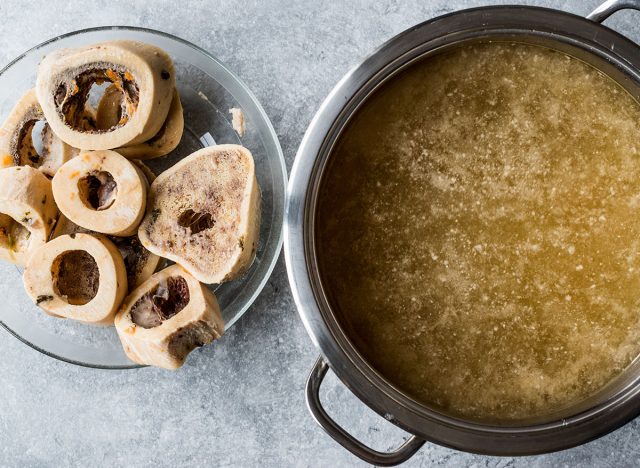By now, you’ve likely heard that bone broth is not just a trendy sip; it’s also good for your body and soul. Bone broth is an excellent source of bioavailable collagen, as it provides your body with collagen in a “whole-food form.” The collagen content in a well-made batch of bone broth can restore your gut’s mucosal lining. This helps calm your intestines, boost digestion, and lower inflammation. Along with these amazing benefits, you’re likely wondering, “Can drinking bone broth every day help you lose weight?” We spoke with an expert and have the tea (or in this case, the broth).
Keep reading to learn more, and when you’re finished, be sure to check out A Dietitian’s #1 Smoothie Recipe for Weight Loss.
Can drinking bone broth every day help you lose weight?

Drinking bone broth by itself likely won’t make you lose weight. However, incorporating it into a nutritious diet can certainly help boost your weight-loss efforts and progress.
“When combined with a well-balanced diet which incorporates variety, moderation, and is calorically appropriate as based on an individual’s specific nutrient requirements, [bone broth] can be useful in aiding weight loss,” confirms Lena Bakovic, MS, RDN, CNSC. “Because of its generally higher protein content, consuming bone broth may help with a feeling of fullness or satisfaction after a meal, which in turn may work to prevent over-eating and alleviate sugar cravings. It is also a low-calorie food, which may be helpful for those requiring caloric deficits to achieve weight loss.”
Additionally, because bone broth has a high water and electrolyte content, it helps keep you hydrated. This is another way it can help you feel satisfied and avoid unhealthy cravings or overeating.
Why should you add bone broth to your diet?

Any nutritious diet can benefit from bone broth because of its electrolyte, water, and collagen protein content.
“Individuals with higher protein requirements or those who are not able to meet their hydration goals with water alone may especially benefit from bone broth consumption,” explains Bakovic. “Compared to other broths, bone broth is generally higher in protein, however, the protein content can vary across brands, so it is always encouraged (as with any packaged food item) to read the Nutrition Facts Label to assess the amount of protein provided per serving.”
Another possible benefit you can derive from incorporating bone broth into your diet is healthy bones and joints. “[Bone broth] contains magnesium, phosphorus, and calcium, which are all important nutrients for bone density/strength,” Bakovic says. “It is thought that the method in which bone broth is prepared by slow-cooking produces chondroitin and glucosamine- nutrients associated with improved joint health.”







